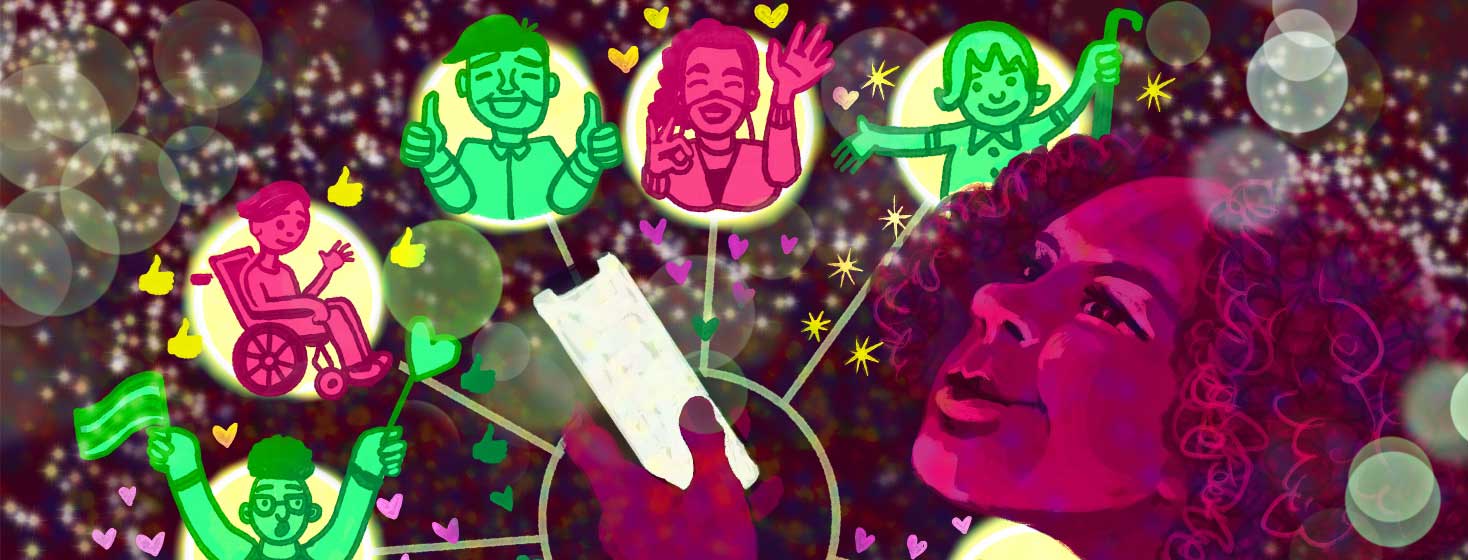Why Chronically Ill and Disabled Friends Are Magic
I am not exaggerating when I say I’m not sure I would have gotten through the last nine months without my online chronically ill and disabled friends. Mainly because of my continued pandemic caution and sheltering, I have lost or had to renegotiate all my in-person relationships, including my marriage.
The only people who get me, it seems, are my chronically ill and disabled friends. I know I’m not alone in that sentiment.
I’ve seen many disabled and chronically ill folks say as much on social media over the last two-and-a-half years.
I only had an inkling of how much my life would change in January.
Finding mutually beneficial support groups
At that time, I’d been in a support group for queer and trans mast cell disease patients for two months. The people in the group are scattered across the country, and each month we meet on Zoom to vent, celebrate our wins, give each other advice, and offer friendship.
Most everyone in the group exercises a similar level of caution to me, so I feel free to talk about my struggles with isolation, sadness, and anger as I watch the world return to normal with little thought for the vulnerable.
They echo my frustrations, and we help each other navigate this challenging time. I have established a weekly check-in with a couple of group members, and they have become close friends.
I’ve also made several friends on Instagram and Discord. We send each other encouraging and lengthy messages back and forth detailing our struggles.
Communicating with these people is an immense relief and feeling less alone. None of them gaslight me, question my behavior, or tell me I should try taking on more Covid risks.
They all understand that I am doing the best I can for myself in these times. They all have various disabilities and chronic illnesses, and some share my diagnoses, including endometriosis, MCAS, migraine, dysautonomia, and generalized anxiety disorder.
Sharing my hard times with others
I had both of my endometriosis excision surgeries during the first two years of the pandemic before I met most of these folks. I felt incredibly alone trying to navigate the stress I felt about my surgery on top of having to be in a hospital with Covid flying around.
The first surgery happened before vaccines were available. For the second, I had to drive from Vermont to Boston.
My ex did not share my level of caution or nervousness about the virus, so I felt I had to work through those alone. How I wish I’d had my online pals then.
Having a supportive community
They came through for me during the worst months of this year, March and April when my marriage ended, and I packed up my life and moved from Vermont to Colorado. People from the mast cell group sat on video calls with me while I packed.
They made calls to Airbnbs and hotels so I could find safe, fragrance-free lodging. These folks were the last people I talked to before I got on the road, as our April meeting happened the night before I left Vermont.
I felt uplifted by their support and knew I would get through the five-day drive successfully because I knew they had my back.
Last month, I decided I was ready to try to make some friends in person. I joined a dating app that allows people to search for friends only.
I created a post looking for Covid-safe pals who wanted to hike or spend time in nature. I had a great response and have since found three people who are either chronically ill themselves or have a chronically ill partner.
The relief I feel is indescribable. These are people I can gather with, and my body feels safe.
They wear masks, check in with me about their risk levels, and are more than happy to hang out outside, even when the weather gets colder.
This is why communities like ours are so important. Many of us do not have people in our in-person (or even online) lives who understand, can empathize, and won’t question us when we say we don’t feel well, when we don’t feel safe doing an activity when the dynamic nature of our illness interferes with plans, or when we have many medical appointments, prescriptions, procedures, and surgeries and are still sick.
People who are chronically ill and disabled understand we won’t ever be healed from our illnesses; instead, we will do the best we can with the available resources.
That’s why disabled and chronically ill friends are magic: they can allow us to be all of ourselves without question.

Join the conversation